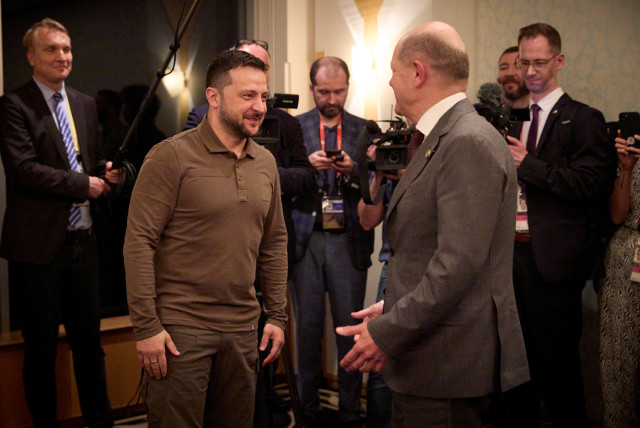Russia-Ukraine war will shape international order - Estonian official

Senior Estonian official warns that the outcome of Russia’s invasion of Ukraine will impact Israel, too.
Russia’s war against Ukraine will shape the international order in a way that will deeply impact small states, including Israel, Estonian Foreign Ministry Director-General Jonatan Vseviov warned on Tuesday.
“If we go back to a world where might makes right, then we are all going to be in trouble,” he said. “Small countries will feel it first.”
Vseviov’s role is similar to Israel’s Strategic Affairs Minister Ron Dermer in the small Baltic state bordering Russia. He is a former ambassador to the US, who has the prime minister’s ear and is a key figure in his country’s foreign and defense policy. He is also one of the architects of NATO’s defense posture in Eastern Europe.
Vseviov was in Israel this week to discuss the Ukraine war with his counterpart in Jerusalem, Ronen Levy, National Security Adviser Tzachi Hanegbi, Knesset Foreign Affairs and Defense Minister Yuli Edelstein, and others. His message was “this is a pivotal war that will change everything, whether we want it or not.
“This war will either shape new norms of international behavior or strengthen the current ones, If we allow it to become the norm that, under certain circumstances a larger neighbor can invade a smaller neighbor and change its borders with force, no border remains safe. If we allow it to become the norm that under certain circumstances aggression pays off, we’re in for a rough ride. This is not only a war on Ukraine; it is a war on every principle we depend on,” he added.
The war's 'existential' meaning
The war in Ukraine is “existential” for Estonia, “as a small state that’s on the periphery of Europe,” Vseviov said. “We care deeply about where countries stand in relation to this. Neutrality is not an option. If you take a neutral stance between aggressor and victim, then de facto you are supporting the aggressor.”
Vseviov commended Israel for making it clear that it opposes Russia’s invasion of Ukraine and consistently votes with most of the international community on the matter at the UN.
In addition, he told Israeli interlocutors that Estonia has three priorities: First, “we need to raise the cost of aggression, making it higher than stopping aggression, through sanctions, political isolation and restrictive measures,” Vseviov said. “The purpose is not to punish Russia, but to alter their cost-benefit analysis.”
Great meeting with Chairman of @KnessetIL Foreign Affairs Committee @YuliEdelstein. Complete likemindedness on existential threats and the need to do more for Ukraine’s victory. pic.twitter.com/7GCH6DtYrm
— Ambassador Jonatan Vseviov (@vseviov) May 22, 2023
Ukraine must also retain the hope that it still has a path to becoming “a normal European country,” along with material assistance, such as humanitarian, economic and military aide.
Vseviov also called to make sure that Russia is held accountable for war crimes. “We are working to establish an international tribunal for the crime of aggression, for which the [International Criminal Court] does not have jurisdiction. The results are crucially important…Those who value the international order cannot only talk the talk, but also get results that communicate to the rest of the world, but also next generations that when we say crimes are unacceptable, we mean to do something about it,” he said.
Israel's involvement with Ukraine
Israel has expressed support for Ukraine and sent humanitarian aide and missile warning systems, but has not yet sent military aid, citing the Russian Army’s involvement in Syria and the hostage Jewish community in Russia.Vseviov said he did not discuss military aid in his meetings “in any acute way” and is not pushing it. He understands Israel has unique security and regional challenges. What he asked is for countries “to make absolutely clear with no ambiguity where you stand and do as much as you possibly can.”
The Estonian official found his Israeli interlocutors to be “very receptive” to his message, and said that “there is a level of understanding between us and our Israeli counterparts that helps us get to the point sooner and faster. We roughly share an understanding of what it feels like to have no strategic depth and be relatively small in a neighborhood that is difficult.”
Discussed global and regional challenges, including the war in , with my colleague @RonenLeviMaozWe will continue to cooperate on tackling our shared security challenges. @IsraelMFA pic.twitter.com/jxTeVNjhPI
— Ambassador Jonatan Vseviov (@vseviov) May 22, 2023
With Iran providing drones and other weaponry to Russia, Europe has gotten closer to Israel’s view on the Islamic Republic.
“We’ve come a long way from a few years ago,” Vseviov said. “It is known in every corner of Europe that Iran has now decided, for reasons that only they fully understand, to get involved in providing Russia with military assistance.
That is not only absolutely unacceptable, but in many ways also proves to the European audiences what kind of a challenge Iran is.”
The Estonian official posited that, as Russia grows more desperate for arms, which he predicted it will, Iran will become bolder in its demands, because Russia has very few countries to which it can turn. “I think it is in all of our interests to end this sooner rather than later, before these dynamics escalate,” he said.
The drones that Iran provided to Russia include components that violate UN Security Council resolutions sanctioning missile sales to and from Iran. The 2015 Iran nuclear deal allows for the “SnapBack” of all sanctions on the Islamic Republic if it violates UNSC resolutions, but in the past, countries other than the US resisted the move.
“Estonia’s position on these matters is usually straightforward,” Vseviov said. “If we have a resolution that has been violated, then we, as the international community, should operate according to what is written and agreed [upon]. If we start [bending] the rules that we ourselves created, then we won’t be able to manage any situation.
“There should be a reaction to the apparent violation. We are motivated by the desire to stop the weapons flow, obviously, and also to disincentivize negative behavior regionally or globally.”
Jerusalem Post Store
`; document.getElementById("linkPremium").innerHTML = cont; var divWithLink = document.getElementById("premium-link"); if (divWithLink !== null && divWithLink !== 'undefined') { divWithLink.style.border = "solid 1px #cb0f3e"; divWithLink.style.textAlign = "center"; divWithLink.style.marginBottom = "15px"; divWithLink.style.marginTop = "15px"; divWithLink.style.width = "100%"; divWithLink.style.backgroundColor = "#122952"; divWithLink.style.color = "#ffffff"; divWithLink.style.lineHeight = "1.5"; } } (function (v, i) { });

